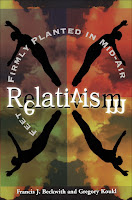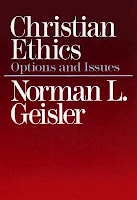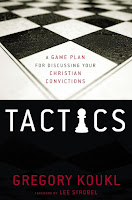Introduction
An interesting meme came across my Facebook feed the other day. It states, "It is okay for you to believe what you believe. It is not okay for you to insist that everyone else believe the same as you." I shared it with a short explanation of the fact that the claim self-destructs. This meme self-destructs because it violates its own claim. It insists that the readers believe what is included in the meme (the idea that we should not insist others believe what we believe). It was not long before my comments were challenged. The conversation included a few different challenges that I addressed. I have included those challenges and my responses below (with a few edits for clarity).
Challenge #1: This is a religion thing!
Response: This is actually a belief that someone is affirming is
right and affirming that its opposite is
wrong. "Right" and "wrong" are terms of morality. It is logically impossible to not affirm someone's morality with the statement in the meme because it is affirming a moral belief. If someone affirms that the belief (that you
should not force your beliefs on others) is
right, then they affirm that its opposite (that you
should force your beliefs on others) is
wrong. If they insist that others hold to that same belief, then they have violated their own belief. That is why it is self-defeating. This has nothing to do with religion; rather it has everything to do with logic.
Challenge #2: There is no morality in this meme.
Response: morality is found in the meme in the implied "should" or "ought" in the affirmative phrase "is not okay." These are terms of obligation that are independent of a person (this is called "objective"). The moral claim is that someone should not force their beliefs on someone else. However, for something like morality to exist, it must have an ontological/metaphysical grounding. If your worldview does not contain such an object (such as God), then objective morality does not exist in your worldview, and nothing can be said to be truly "right" or "wrong;" it is all just a matter of opinion (and enforceable by who's in power). Now, if the person posting this meme is merely offering an opinion, then that is fine. It is their opinion that beliefs should not be forced on someone else, but it cannot go beyond an opinion to be an actual moral obligation. If morality is not objective, then any obligations end at the person asserting them; they do not apply beyond that person (this is called "subjective"). And that is exactly what this meme is denouncing
and violating simultaneously. There
is morality in this meme; there
is not sound logic in this meme.
Challenge #3: We can be good without God. You are saying that I'm immoral because I don't believe the way you do.
Response: That is not my claim. I'm saying that it is only with an ontological foundation that morality (in any objective sense, which is what the meme seems to want to enforce) even exists. It is only if God exists that someone can be either moral or immoral. If there is no ontological grounding for morality, then we are all amoral because the world is amoral. This is not the same as "immoral." "Amoral" indicates the absence of a standard by which to conclude someone or something is moral or immoral. None of what I have said even implies someone's moral status; I've only made claims about the existence of morality that would allow statements about someone's moral status.
Conclusion
This meme and many of its type are quite common on
social media these days. It is imperative that we logically evaluate their claims for soundness. If we find that they are not, we need to show how that is so. It is important that people be able to recognize bad logic when they see it, so they can learn to think clearly as other issues and claims arise.
Follow Faithful Thinkers On Social Media
Recommended Books for Further Investigation:

























